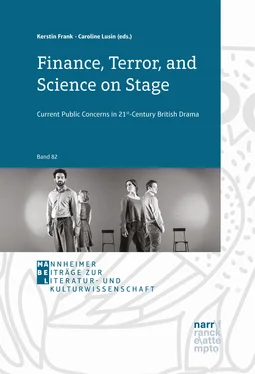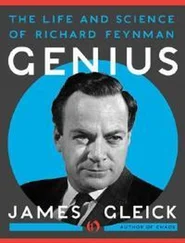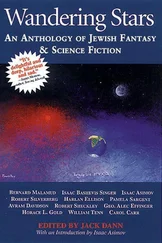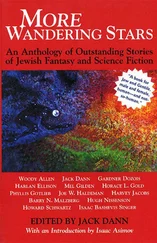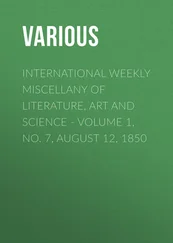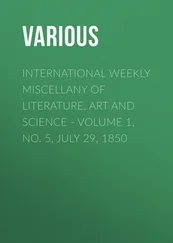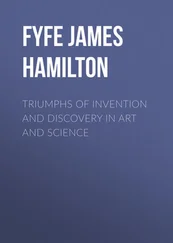1 ...6 7 8 10 11 12 ...16 However, when one takes the background of absurdist dystopia into consideration, it becomes clear that this apparent ‘lack of decision’ is not only deliberate but a constitutive characteristic of the play. It is indeed still intensified in the short fifth act, which produces the final impressions that the audience is left with. Here, ‘The Twelve’ stand on stage and soliloquise about their experiences after the collapse of the protest movement. It is highly significant that each of them talks to the spectators separately, thus mirroring Ruth’s prognosis that “the singing will stop and become individual voices again” (126). Fittingly, the characters’ stories often show some kind of retreat into the domestic sphere and a reallocation of priorities to “home” (129, 130) and private relationships. The ruinous implications for John’s insistence that belief has to and will last and will ultimately prove beneficial for everyone (126, 128) were already prepared by the violent riots at the end of act four, which leave the spectators with images diametrically opposed to any kind of community spirit. Typically, however, act five is equally devastating for Ruth’s position. She openly admits that she is at a loss about whether she took the right decision and whether the values on which it was based still hold (130, 132). The key experience that Ruth seems to be left with now is loneliness, having no one to call at night when everything becomes too much for her (132f.). In this respect, the order of the soliloquies openly links her both with Edith, who is planning to kill herself (130), and with Sarah (132), who used to be diametrically opposed to the Prime Minister through her belief in moral absolutes but is now troubled by insomnia and insistent memories and dreams in a very similar manner (131f.). Finally, thus, it does not seem to matter whether one chooses to base one’s actions on the belief in a strict division between good and evil or on Ruth’s ‘grey area’ in-between – the outcome is always guilt, desolation and confusion.
This bleak result is finally pinpointed again by the soldier Rob, who has been a minor character so far but is now given the concluding soliloquy. He followed John’s career on the internet, because he wanted “to know” and thought “[John]’d help” (133), and was then sent to Iran as a result of Ruth’s decision. Rob presents a very detailed, almost stream-of-consciousness narrative of a crucial scene at a roadblock in Iran where he could not decide whether a veiled woman running towards him was “good” or “evil” (134), in the end following the rules and shooting her anyway. Now he is troubled by permanent uncertainty even more than by guilt, just like Ruth: “So in the end, we can’t tell. If she [the running woman] was good, or evil” (135) – and therefore, if his decision was right or wrong. Rob realises retrospectively that this was exactly the kind of moral certainty that he craved from John (135) but did not get, despite all the idealism that this leader stood for. Thus, the soldier ends on a very fitting summary not only of his own (and the other characters’) position after John’s disappearance but also of the audience’s situation after watching the play: “Left us all to – work it out ourselves.” (135) As the highly metadramatic statement makes clear, this is the ultimate aim of the play – making the spectators aware of the fundamental issues so often hidden by the web of political rhetoric, drawing them into these problems through an experiential approach and then leaving each audience member ‘to work it out him- or herself’. As Dan Rebellato (15, 27) has noted, this ultimate “openness” and “instability” (which he diagnoses – among other works – with regard to Bartlett’s Earthquakes in London )1 is very different from earlier British political theatre and may even come across as deliberate “radical naivety” (ibid., 18, 27). Nevertheless, this pointedly does not make the new plays any less effective compared with the tradition; on the contrary, they become “politically more questioning and radical” (ibid., 27). According well with Rebellato’s points, the foregoing analysis of 13 has demonstrated how – after the apparent disappearance of political theatre in the 1990s – absurdist dystopia has become a means of returning to the issue of political power, its aims and its justifications in the 21 stcentury. Compared with earlier examples, 13 uses this form more obliquely and thereby ultimately intensifies the evocation of both ambiguity and unease, refusing the audience any kind of guidance or consolation and leaving them completely on their own in confronting these grave and possibly unanswerable questions. This effect is obviously at its most intense in the direct confrontation with the play in the theatre. Thus, 13 and its experiential approach can be considered an impressive demonstration of the unique potential of (performed) drama for working on the spectators’ emotions even with regard to apparently purely rational issues like political power and ideology, thereby making it very hard for them to retreat to a safe distance.
Bibliography
Primary Sources
Bartlett, Mike. Game. London: Nick Hern Books, 2015.
—. King Charles III. London: Nick Hern Books, 2014.
—. 13. London: Bloomsbury Methuen Drama, 2014 [2011].
—. Love, Love, Love. London: Bloomsbury Methuen Drama, 2010.
—. Earthquakes in London. London: Bloomsbury Methuen Drama, 2010.
—. Cock. London: Bloomsbury Methuen Drama, 2009.
—. My Child [2007]. Plays: 1. London: Bloomsbury Methuen Drama, 2016 [2011].
Blair, Tony. “Leader’s Speech.” Labour Party Conference. Brighton. 30 September 1997.
Cameron, David. “The Big Society.” Liverpool. 19 July 2010.
May, Theresa. “Speech on Brexit.” Lancaster House. 17 January 2017.
—. “Shared Society: Charity Commission Annual Lecture.” London. 9 January 2017.
Osborne, George. “Budget 2010.” The Telegraph . 22 June 2010. http://www.telegraph.co.uk/finance/budget/7846849/Budget-2010-Full-text-of-George-Osbornes-statement.html. Accessed on 29 March 2017.
Adiseshiah, Siân. “Political Returns on the Twenty-First Century Stage: Caryl Churchill’s Far Away, Drunk enough to Say I Love You?, and Seven Jewish Children. ” C21 Literature: Journal of 21 st-century Writings 1.1 (2012): 103–21.
Angelaki, Vicky. “Politics for the Middle Classes: Contemporary Audiences and the Violence of Now.” Contemporary British Theatre: Breaking New Ground. Ed. Vicky Angelaki. Basingstoke: Palgrave Macmillan, 2013. 57–78.
Atkinson, Will, Steven Roberts and Mike Savage. “Introduction: A Critical Sociology of the Age of Austerity.” Class Inequality in Austerity Britain: Power, Difference and Suffering. Eds. Will Atkinson, Steven Roberts and Mike Savage. Basingstoke: Palgrave Macmillan, 2012. 1–12.
Benedict, David. “Review: ‘13’”. Variety. 26 October 2011. http://variety.com/2011/legit/reviews/13-1117946455/. Accessed on 29 March 2017.
Billington, Michael. “13 – Review.” The Guardian. 26 October 2011. https://www.theguardian.com/stage/2011/oct/26/13-review. Accessed on 29 March 2017.
—. “Hello Cruel World.” The Guardian . 17 December 2003. https://www.theguardian.com/stage/2003/dec/17/theatre3. Accessed on 29 March 2017.
Blyth, Mark. Austerity: The History of a Dangerous Idea . Oxford: Oxford UP, 2013 [2005].
Booker, M. Keith. Dystopia . Ipswich, Mass.: Salem Press, 2013.
—. The Dystopian Impulse in Modern Literature: Fiction as Social Criticism . Westport: Greenwood Press, 1994.
Читать дальше
